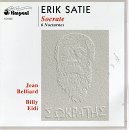| All Artists: Satie, Belliard, Eidi Title: Socrate / 6 Nocturnes (Reis) Members Wishing: 0 Total Copies: 0 Label: Timpani Original Release Date: 1/1/2008 Re-Release Date: 4/29/2008 Album Type: Import Genre: Classical Styles: Opera & Classical Vocal, Chamber Music, Historical Periods, Classical (c.1770-1830) Number of Discs: 1 SwapaCD Credits: 1 UPCs: 750582918223, 3377891311417 |
Search - Satie, Belliard, Eidi :: Socrate / 6 Nocturnes (Reis)
 | Satie, Belliard, Eidi Socrate / 6 Nocturnes (Reis) Genre: Classical
|
Larger Image |
CD DetailsSimilar CDs
|
CD Reviews"Pure, White Music": E. A. L. Satie's SOCRATE... Sébastien Melmoth | Hôtel d'Alsace, PARIS | 05/13/2008 (5 out of 5 stars) ".
"To me there are only two languages in the world: French and Greek."--Oscar Wilde [(1892), regarding his French play, Salomé]. . Brilliant men of Art frequently cultivate an aura of mystery and grandeur: it's part of their ego which of course is large enough to feel it has something worthy of expression. The grey velvet clad Erik Satie wrapped his artistic life in an ascetic atmosphere of eccentricity. (By the time of the Fin de Siècle this was a very Parisian aesthetic mode in any case, from Baudelaire to Huysmans to Lorrain to Proust, to name but a few. Monsieur De Phocas (Decadence from Dedalus) The Penguin Book of French Poetry: 1820-1950; With Prose Translations (Penguin Classics) The aforementioned were littérateurs, and while Satie did some writing he was also a graphic artist on a small scale exercising calligraphy and finely chiselled Parnassian musical orthography.) . But Satie's humorous obscurity while curious, acutally masks an even more remarkable reality for his achievement though small in quantity is utterly exquisite in quality. And his magnum opus--that towards which he had striven all his artistic life--must surely be his Socrate (1919). . But what exactly is Satie's Socrate? Such a multifaceted esoteric work of art would require a thesis to describe in exactitude, but here we can just make a few notes. There are two distinct versions of Socrate. One version is the ironically termed "Drame symphonique"--(the irony being that the micro-managed "drama" is Minimalistic, likewise the scoring of the "symphony" orchestra consists of solo instruments used with chamber intimacy). Socrate + Melodies The other version of Socrate is something like a song-cycle for tenor and piano, and this is Timpani's offering here. Satie set portions of Plato's texts from Symposium, Phaedrus, and Phaedo in French translation by Victor Cousin. He treats these primary texts of Western civilization with a dignity and respect accorded to the Gospels, setting them to a noble music of a pellucid crystallinity--a dialectical "white music" of blanc et noir son gris. The overall ethos is extraordinarily subtle and detached, self-effaced and equitable, while featuring an unction--an internal momentum--of unmistakable imagination. This concentration imposes a précis upon a sensible auditor who may psychically be transported into the mise-en-scène itself: withal, the effect is spellbinding and transcendent. . The reading here is superb, and this disc in particular is very satisfactory as it features Socrate as the primary work and supplements it with the contemporaneous Nocturnes, making for a very nice and aesthetically unified programme. Billy Eidi is expert with this French material, and Jean Belliard's light tenor fits the bill. (Caveat: unfortunately this 2008 reissue of Timpani's 1993 disc does not include the libretto to Socrate; furthermore, though the booklet assures us the complete text is available at Timpani's website, at this date it is not to be found.) By contrast, Nimbus' 1985 release with Huges Cuenod and Geoffrey Parsons features a very thick booklet with full texts and notes, but the programme is of French song-cycles wherein Socrate loses some of its pristine impact--nevertheless, highly recommended. French Song Cycles . See too: Erik Satie The Banquet Years: The Origins of the Avant-Garde in France - 1885 to World War I Symposium (Oxford World's Classics) Phaedrus (Oxford World's Classics) Phaedo (Oxford World's Classics) . "[I respect] the naïveté, the freshness, the simple romantic charm of the Gospels. When one returns to the Greek it is like going into a garden of lilies out of some narrow dark house. It is a delight to me to think that as far as [Christ's] conversation was concerned, Socrates [may] have reasoned with him, and Plato understood him."--Oscar Wilde [(1897), in his letter from Reading Prison known as De Profundis]. TNIV Bible, The: Timeless Truth in Today's Language (Today's New International Version) ." |

 Track Listings (10) - Disc #1
Track Listings (10) - Disc #1


